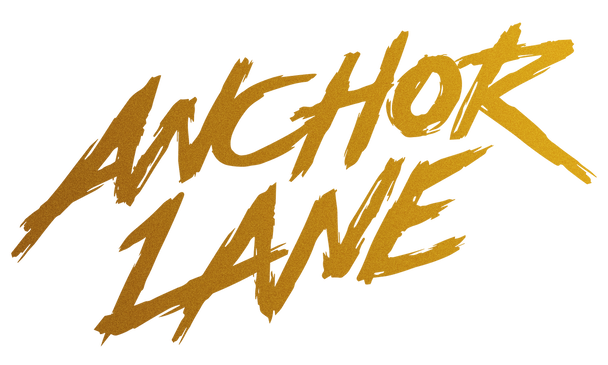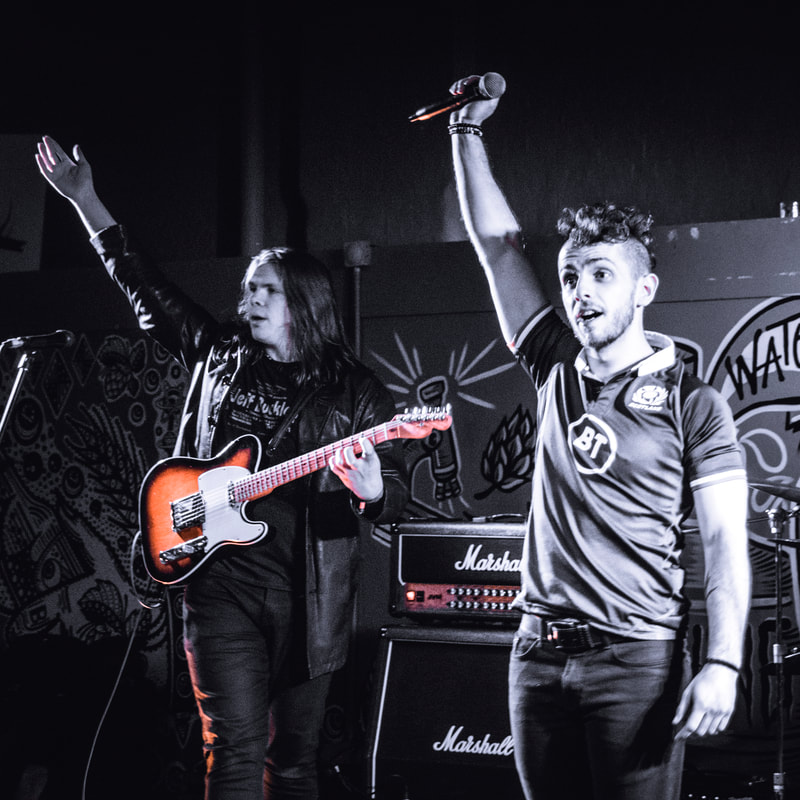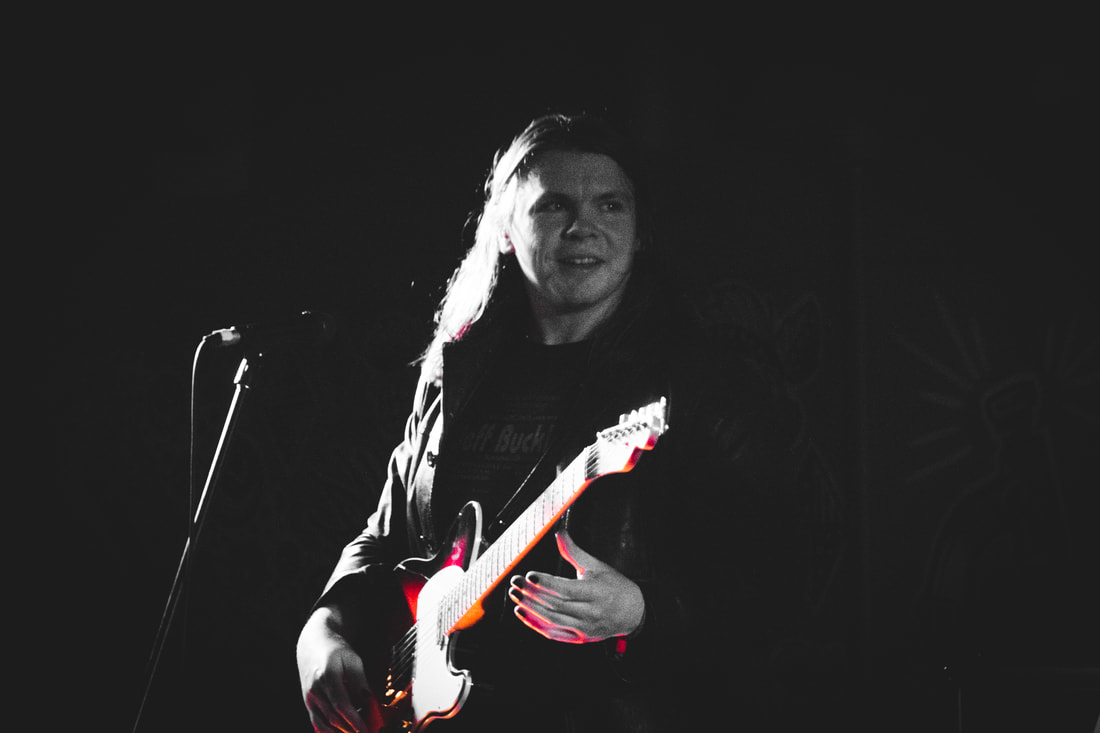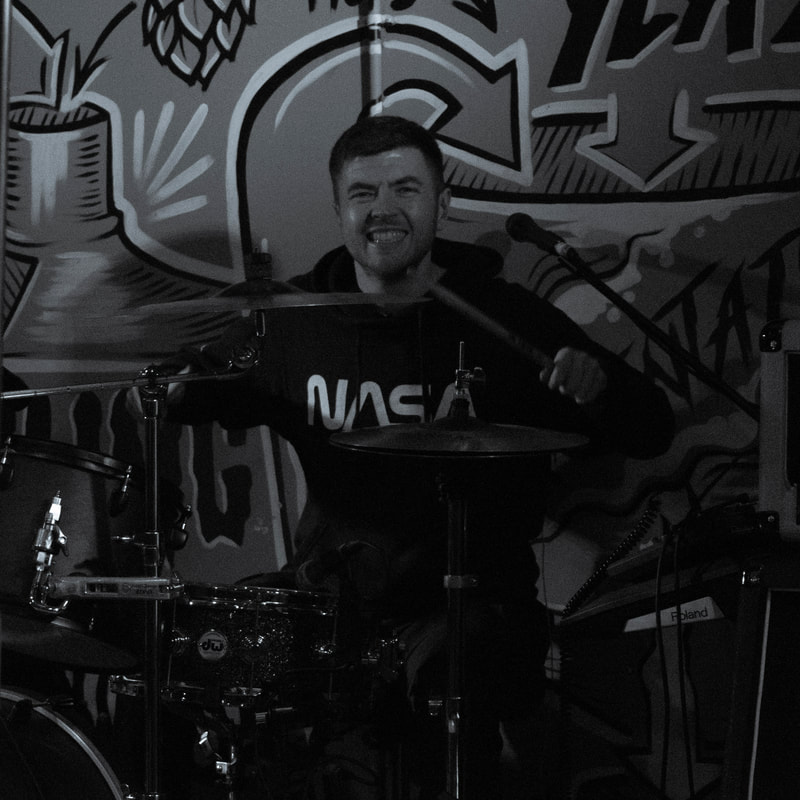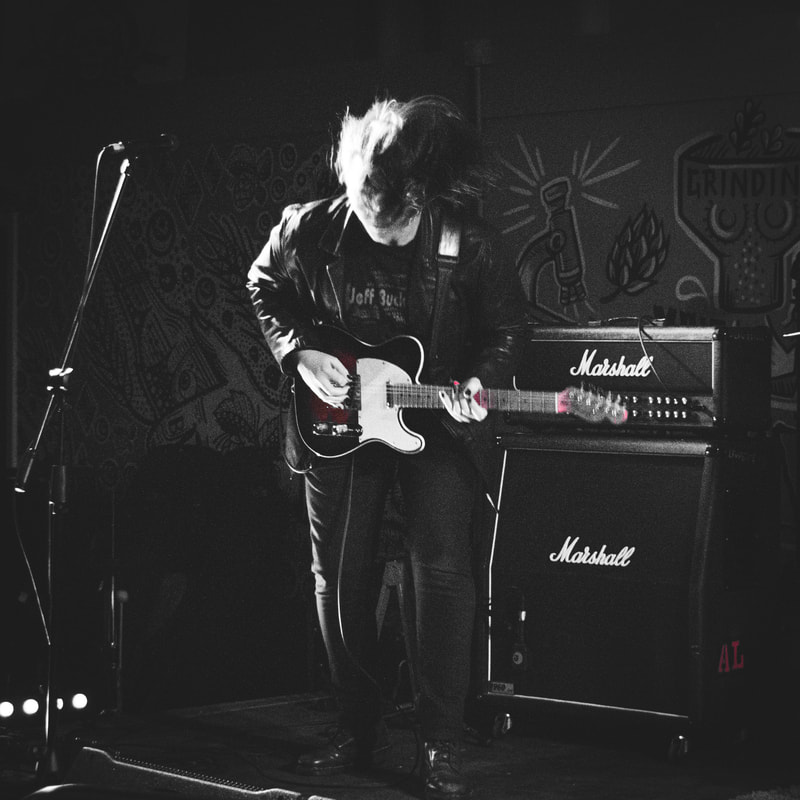|
|
With a their debut album 'Casino' receiving critical acclaim and their second album 'Call This A Reality?' going down a storm with fans, the world certainly seems to be Anchor Lane's oyster. I was lucky enough to have a chat with Anchor Lane guitarist Lawrence O'Brien about the current album, touring and stretching.
'Call This A Reality?' is out now for more info visit www.anchorlanemusic.com
Don't forget, you can catch the lads live here in 2023:
'Call This A Reality?' is out now for more info visit www.anchorlanemusic.com
Don't forget, you can catch the lads live here in 2023:
- 27 May | Glossop, (The Globe) 'A Night with Anchor Lane' (limited tickets left!)
- 16 Jun | Lancaster, The Pub
- 17 Jun | Southampton, Suburbia
- 01 Jul | Whitehaven, Solway Hall
- 29 Jul | Butefest, Isle of Bute
- 05 Aug | The Vault, Newton Stewart
Interviewer and photos: David Weddle
L. Hello, Hello.
D. It's been a canny little while since you put out your last album ‘Call This A Reality’, smashing album, sounds class live by the way.
L. Thanks, we put a lot of effort in to that.
D. Speaking of putting the effort in to it, from the creative side of things you’ve been in Anchor Lane now for the debut album and this album. How does the writing experience compare to your previous bands with Anchor Lane, do you think you’ve managed to bring anything across to this from your previous bands, Attica Rage and Lawrence O’Brien Band?
L. I see, well that was a good question. The thing is everyone you play with, everyone who you are in a band with, has a different experience you bring in different influences than one another and so it was just different by nature in the same way you talk to someone and then someone else, its just a bit different. But you know we definitely have an alignment and a similarity in taste, there’s quite a big common bubble, if you like, that meant when writing there was a lot of opportunity to try different things. As you probably heard on the album there's not really anything that sounds much like anything else, they're all rather different from itself.
D. That sounds like it was an intentional thing, that you all wanted to have it completely different from each other so nothing sounded the same or was it just experimenting with different sounds. Were you looking for something in particular or were you just wanting to write an album for how you felt at the time you were writing it, what was the goal?
L. The goal was to make something that was different, I guess. There was also an intention, definitely, to write something more modern than our previous stake, with Casino. We wanted something that sounded like a band from now rather than having one foot in a traditional door and one foot in the modern door, we wanted to be in the modern house. We wanted to be sitting in the kitchen, purely two feet in the house of modern. Anyway, strange, obscure tangent aside, we wanted something individual and we wanted something that represented us as people who are in their mid twenties in Glasgow, in Scotland in 2022, 2021 at the time. And yeah, just have something that’s truthful rather than something that kind of derogative.
D. You did mention you are from Glasgow, has there been any major influences from other artists in the area that you feel like you want to sound like that person or you’ve drawn influence from a particular band or a particular part of the uniqueness of Glasgow?
L. Well Glasgow has a really good music scene and there are bands locally, like Monkey Puzzle and bands like Megalomatic that definitely took an influence in what we wanted to write like. You know, you go to gigs of your friend's bands and that definitely sort of inspires you. Because its someone who is living the same life as you and they are creating something that is kind of rootsy and inspirational that way, and then of course you’ve got the big bands as well. So Biffy Clyro was a big influence on the album although, ironically its not me whose the Biffy Clyro fan its more the other two. I can appreciate them and I think they’re brilliant musicians but they don’t resonate with me in the same way that Metallica and Pantera , Wolf Alice and bands like that do.
D. Yeah, I can see the influence from those bands in your playing, on Casino particularly, there's a lot of fantastic solos and you saying that there I was like, I totally get where that came from now.
L. The thing is at the root there, I am Metal as hell. But there is a fair departure from that on this album, it was more to have a song setting the solos was kind of a lesser priority we just wanted something that kind of bridged that area between being a Metal record, a punk record and even a pop record, you know I’d say that the influences and hence the outcome of the songs is based in pop, because you know you can have all that aggression but if you have all that screaming over it, its not really going to have much throw in ways of being tangible.
D. A lot more depth to it I guess?
L. Yeah, a lot more melody. I dunno I just can’t do things with out melody despite all the brutality that I’m in to.
D. Do you have a favourite track from the new album to play live and why?
L. It’s probably ‘ I don’t have another soul to pour’ which is the second single and is the last song on the album. It was second last when it was written and although it does have a pop element to the verse and chorus parts of the song, the way we play it is pretty indulgent on the instruments. We go a bit bad on the guitar bit, a bit mad on the drums and you know me, that’s my area, that’s my ball park.
D. On the flipside of that I guess, is there a track that you don’t particularly like playing live?
L. From the new album there isn’t really anything because we really tried so thoroughly to make something that had no weak spots. We had plenty of songs that weren’t as good but you know, the secret is you know when to say goodbye to them. So we by the time we were done, we probably put together 30 or 35 songs, and its twelve including the interval that are on there, to give you an idea. So maybe it’s the best third roughly speaking. And that was just because we didn’t want an album that was two great songs at the beginning and a great song at the end. We wanted something that was thorough because theres a few to many albums like that.
D. I can think of one or two.
L. (Laughs) I can think of one or two hundred as well.
D. Was that a collective decision. Did you all sit down and pick this, this, this or was it like individually you’ve all got these song ideas in you head and you’ve gone through them before presenting them to the rest of the band members. How does your creative process work?
L. So with Casino it was much more of everyone in the room and just making riffs and the melodies and stuff together. But for some reason that just wasn’t working this time, coming out of lockdown I personally had a lot of feelings and a lot of ideas and being the kind of person who likes to make sure I know what I’m giving before I project it. So the songs on the album came from my pitches. So I would put together, sometimes it was just a verse and chorus and sometimes it was a first full structure. I would put together the guitar parts and the lyric parts and the melody that goes along with the lyrics and I would send it in, people would get the gist of it and we’d throw our ideas around and then either if it was at the latter end of the process and there wasn’t much development beyond that before we recorded it with Bruce and some of them were like year long developments that just kind of gradually refined themselves into what they were going to be. So there are some songs that are pretty similar to how they were when I sent them in minus drums and Conor signing and all that, and then some of them like ‘Sycophant Disorder’ is a complete spin on its head from how it started so the half of the chorus is what we ended up with so it’s a real mix but I guess that the point is I was sending in the ideas and we’d thrash it out together until everybody was happy with it. And then you eventually got what you can hear on the record.
D. I wanted to speak very briefly about the people you have worked with in the past, you’ve got the likes of Ricky Warwick and Toby Jepson – Wayward Sons and other iconic names. Toby Jepson was in Little Angels and they were actually my first concert so it was pretty cool when I saw his name there, with that in mind is there anybody out there that you would love to work with that you haven’t worked with so far?
L. Really? Wow, that’s amazing. Well I mean how long have you got? There are hundreds of people who are icons of ours that I would love to work with. Someone I would really love to work with is Nuno Bettencourt.
L. The thing is at the root there, I am Metal as hell. But there is a fair departure from that on this album, it was more to have a song setting the solos was kind of a lesser priority we just wanted something that kind of bridged that area between being a Metal record, a punk record and even a pop record, you know I’d say that the influences and hence the outcome of the songs is based in pop, because you know you can have all that aggression but if you have all that screaming over it, its not really going to have much throw in ways of being tangible.
D. A lot more depth to it I guess?
L. Yeah, a lot more melody. I dunno I just can’t do things with out melody despite all the brutality that I’m in to.
D. Do you have a favourite track from the new album to play live and why?
L. It’s probably ‘ I don’t have another soul to pour’ which is the second single and is the last song on the album. It was second last when it was written and although it does have a pop element to the verse and chorus parts of the song, the way we play it is pretty indulgent on the instruments. We go a bit bad on the guitar bit, a bit mad on the drums and you know me, that’s my area, that’s my ball park.
D. On the flipside of that I guess, is there a track that you don’t particularly like playing live?
L. From the new album there isn’t really anything because we really tried so thoroughly to make something that had no weak spots. We had plenty of songs that weren’t as good but you know, the secret is you know when to say goodbye to them. So we by the time we were done, we probably put together 30 or 35 songs, and its twelve including the interval that are on there, to give you an idea. So maybe it’s the best third roughly speaking. And that was just because we didn’t want an album that was two great songs at the beginning and a great song at the end. We wanted something that was thorough because theres a few to many albums like that.
D. I can think of one or two.
L. (Laughs) I can think of one or two hundred as well.
D. Was that a collective decision. Did you all sit down and pick this, this, this or was it like individually you’ve all got these song ideas in you head and you’ve gone through them before presenting them to the rest of the band members. How does your creative process work?
L. So with Casino it was much more of everyone in the room and just making riffs and the melodies and stuff together. But for some reason that just wasn’t working this time, coming out of lockdown I personally had a lot of feelings and a lot of ideas and being the kind of person who likes to make sure I know what I’m giving before I project it. So the songs on the album came from my pitches. So I would put together, sometimes it was just a verse and chorus and sometimes it was a first full structure. I would put together the guitar parts and the lyric parts and the melody that goes along with the lyrics and I would send it in, people would get the gist of it and we’d throw our ideas around and then either if it was at the latter end of the process and there wasn’t much development beyond that before we recorded it with Bruce and some of them were like year long developments that just kind of gradually refined themselves into what they were going to be. So there are some songs that are pretty similar to how they were when I sent them in minus drums and Conor signing and all that, and then some of them like ‘Sycophant Disorder’ is a complete spin on its head from how it started so the half of the chorus is what we ended up with so it’s a real mix but I guess that the point is I was sending in the ideas and we’d thrash it out together until everybody was happy with it. And then you eventually got what you can hear on the record.
D. I wanted to speak very briefly about the people you have worked with in the past, you’ve got the likes of Ricky Warwick and Toby Jepson – Wayward Sons and other iconic names. Toby Jepson was in Little Angels and they were actually my first concert so it was pretty cool when I saw his name there, with that in mind is there anybody out there that you would love to work with that you haven’t worked with so far?
L. Really? Wow, that’s amazing. Well I mean how long have you got? There are hundreds of people who are icons of ours that I would love to work with. Someone I would really love to work with is Nuno Bettencourt.
D. Talking about playing live, you’ve toured pretty consistently recently.
L. We have been known to do so yep.
D. You came to Newcastle recently and there was a bit of a hiccup with the venue so you had to end up playing with a line-up that you might not normally play with I guess. It was an indie kind of line-up.
L. Yeah so it was a funny one. Pardon me, they all kind of blend in to one eventually, it’s kind of like remembering what you had for dinner that night. Remind me what the venue was called.
D. That was Anarchy Brewery.
L. Anarchy Brewery, yeah. So it was a really, really nice place. It was kind of echoey because it was made of stone but the stage sound was really good. And it was good time because you had real mix of folks. I think it ended up well. They were really nice to us, they gave us on departure some really nice craft beers. There was a guy on the bar called Scott, a guy with a big beard and a heart the size of him, he was just really nice.
D. What I was going to ask was that it did seem to phase you and your performance didn’t seem to be affected by the last minute change. How do you prepare for a live show, is there something in particular you do for every venue regardless of where it is?
L. Yeah so, I would say the most important thing which might be an unusual answer, is stretching. Cos you know, if you think of Graeme you know, he’s been crammed in a van and you’ve suddenly to do stuff that’s not exactly primary school stuff that you're performing so you need to stretch yourself. And the thing is between the soundcheck and maybe you’ve got a Green room and you’ve got to run the merch because you don’t have your own merch guy so you’ve kind of got to like.. I find myself standing by the merch and trying to discretely stretch without drawing too much attention to myself. and the others go through similar sort of routines, you just try to find a corner and that’s when you try to touch your toes.
D. You’ve gone from support band for a lot of the last year, you were supporting Virgin Marys recently. And you’ve gone from support act to headline act on this current tour with this album. Do you feel an extra pressure being a headliner or is it something that doesn’t phase you?
L. It’s actually a relief believe it or not. And I think one of things is that all of the time that you’re travelling, getting that extra time on stage makes it really worthwhile. Because sometimes when your playing and travelling from wherever to wherever you only get half an hour a go, and it feels kind of like you’re just getting started and you have to end. But if you’re getting an hours worth its like you know we’ve come here to actually have a good length of time. And also, you know, you can get in early and get to soundcheck and change your clothes, eat and do your stretching all within about half an hour before you have to go on stage again. Its so much better pace. It’s nothing to do with us not wanting to be a support band for the sake of other bands, it’s more of a scheduling thing.
D. It’s interesting to find that you feel less of a pressure being the headline, I would have assumed that it would be the other way around so that’s really interesting to find out.
L. I’m not sure if that’s a common answer but it’s and honest one.
L. We have been known to do so yep.
D. You came to Newcastle recently and there was a bit of a hiccup with the venue so you had to end up playing with a line-up that you might not normally play with I guess. It was an indie kind of line-up.
L. Yeah so it was a funny one. Pardon me, they all kind of blend in to one eventually, it’s kind of like remembering what you had for dinner that night. Remind me what the venue was called.
D. That was Anarchy Brewery.
L. Anarchy Brewery, yeah. So it was a really, really nice place. It was kind of echoey because it was made of stone but the stage sound was really good. And it was good time because you had real mix of folks. I think it ended up well. They were really nice to us, they gave us on departure some really nice craft beers. There was a guy on the bar called Scott, a guy with a big beard and a heart the size of him, he was just really nice.
D. What I was going to ask was that it did seem to phase you and your performance didn’t seem to be affected by the last minute change. How do you prepare for a live show, is there something in particular you do for every venue regardless of where it is?
L. Yeah so, I would say the most important thing which might be an unusual answer, is stretching. Cos you know, if you think of Graeme you know, he’s been crammed in a van and you’ve suddenly to do stuff that’s not exactly primary school stuff that you're performing so you need to stretch yourself. And the thing is between the soundcheck and maybe you’ve got a Green room and you’ve got to run the merch because you don’t have your own merch guy so you’ve kind of got to like.. I find myself standing by the merch and trying to discretely stretch without drawing too much attention to myself. and the others go through similar sort of routines, you just try to find a corner and that’s when you try to touch your toes.
D. You’ve gone from support band for a lot of the last year, you were supporting Virgin Marys recently. And you’ve gone from support act to headline act on this current tour with this album. Do you feel an extra pressure being a headliner or is it something that doesn’t phase you?
L. It’s actually a relief believe it or not. And I think one of things is that all of the time that you’re travelling, getting that extra time on stage makes it really worthwhile. Because sometimes when your playing and travelling from wherever to wherever you only get half an hour a go, and it feels kind of like you’re just getting started and you have to end. But if you’re getting an hours worth its like you know we’ve come here to actually have a good length of time. And also, you know, you can get in early and get to soundcheck and change your clothes, eat and do your stretching all within about half an hour before you have to go on stage again. Its so much better pace. It’s nothing to do with us not wanting to be a support band for the sake of other bands, it’s more of a scheduling thing.
D. It’s interesting to find that you feel less of a pressure being the headline, I would have assumed that it would be the other way around so that’s really interesting to find out.
L. I’m not sure if that’s a common answer but it’s and honest one.
D. You are have a few dates left this year, you have Glossop at the end of this month then Lancaster, Southampton and all the way up to Whitehaven – Solway Hall. There are a couple of bands on there with you, Religion of Tomorrow and Arguer.
L. Arguer and Religion of Tomorrow, yes it’s nice having support set up so early. I feel that’s not always a thing that happens. We’ve turned up to venues before and the interpretation has been that the support band was the figment of the promoter’s imagination.
D. What do you do in that situation?
L. One time we supported ourselves. Our support didn’t show up so Conor, he’s one for the acoustic guitar so he did a mix of Anchor Lane songs and some covers.And then the joke was of course, when we got on stage “That support act was shite!”.
D. What do you hope the future hold for Anchor Lane, have you got a target in mind or are you happy to just keep creating as you go?
L. You know the more time that we keep doing this, the more people get to hear our music and get to hear our message. And you know we are just kind of looking for an exponential endeavour really. We’re just looking to tour as much as we can and get on more of the supports and bring more people to our shows. Just keep doing what we’re doing really, you just build it and build it and then you’ve got something you can take serious pride in.
D. Do you have any words of advice for any one starting out in the music business that you’ve learnt that you wish someone had told you when you started out?
L. The thing is for me it seems to have worked out alright because, you know, I’ve got my own teaching business and we’ve got Anchor Lane which is a thriving business as well. But I was so focussed on the intricacy of music itself all the way growing up that I got a bit of a fright when I became an adult and I actually had to start thinking about finances. Going hey wait a minute I actually completely forgot about trying to make this into a business. You figure it out.
My advice is allow yourself to get caught up in the wonder of music but also consider it as a logical endeavour as well.
D. Sound advice. Awesome well thank you very much, its been a pleasure speaking with you.
L. It has been Dave, very much so, speak to you soon.
L. Arguer and Religion of Tomorrow, yes it’s nice having support set up so early. I feel that’s not always a thing that happens. We’ve turned up to venues before and the interpretation has been that the support band was the figment of the promoter’s imagination.
D. What do you do in that situation?
L. One time we supported ourselves. Our support didn’t show up so Conor, he’s one for the acoustic guitar so he did a mix of Anchor Lane songs and some covers.And then the joke was of course, when we got on stage “That support act was shite!”.
D. What do you hope the future hold for Anchor Lane, have you got a target in mind or are you happy to just keep creating as you go?
L. You know the more time that we keep doing this, the more people get to hear our music and get to hear our message. And you know we are just kind of looking for an exponential endeavour really. We’re just looking to tour as much as we can and get on more of the supports and bring more people to our shows. Just keep doing what we’re doing really, you just build it and build it and then you’ve got something you can take serious pride in.
D. Do you have any words of advice for any one starting out in the music business that you’ve learnt that you wish someone had told you when you started out?
L. The thing is for me it seems to have worked out alright because, you know, I’ve got my own teaching business and we’ve got Anchor Lane which is a thriving business as well. But I was so focussed on the intricacy of music itself all the way growing up that I got a bit of a fright when I became an adult and I actually had to start thinking about finances. Going hey wait a minute I actually completely forgot about trying to make this into a business. You figure it out.
My advice is allow yourself to get caught up in the wonder of music but also consider it as a logical endeavour as well.
D. Sound advice. Awesome well thank you very much, its been a pleasure speaking with you.
L. It has been Dave, very much so, speak to you soon.

